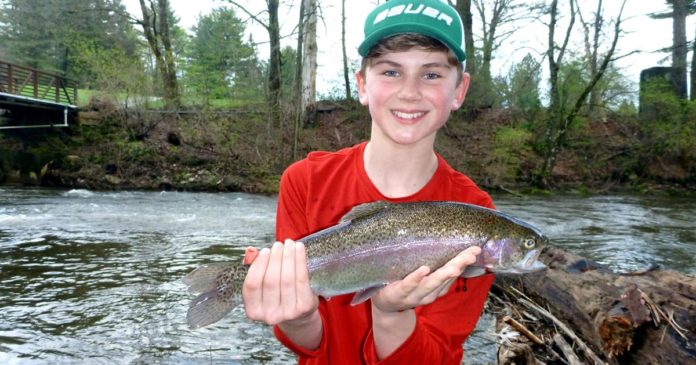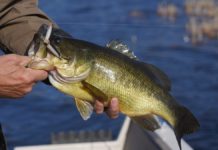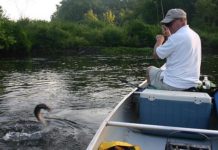Despite lingering snow cover in some areas of the state, the Vermont Fish and Wildlife Department says anglers can still have fun and be successful early in the season if they keep a few strategies in mind.
“Just like any other time of year, anglers fishing early in the spring should adjust their tactics based on conditions,” said State Fisheries Biologist Shawn Good. “Trout will become more active with warmer water temperatures. If you can find a good location and present your bait or lure without spooking the trout, you’ll have a good chance of catching a few fish, and enjoy a nice day outside.”
Good adds that finding a small to medium low-elevation river or stream that is not too murky from spring runoff can be key. Trout are coldblooded and may be slow to bite especially with low water temperatures, so it is important that they can also see your bait, lure or fly.
Larger baits can often be more effective for enticing early-season trout into biting. Spin-anglers should try nightcrawlers, egg imitations, or bright colored spoons and spinners. Fly anglers may find success in the early season by drifting large, more visible flies such as wooly buggers, streamers, or San Juan worms along the bottom in slower pools and runs.
Trout will often hold close to the bottom in the deeper areas of streams during high flow conditions to conserve energy. Choose locations and tactics that allow you to fish using a slow retrieval right along the bottom. Focus on deep holes behind current breaks created by big boulders, downed trees or log-jams where trout may be resting. If possible, approach the hole from downstream as trout will often orient themselves facing the current.
While Vermont offers excellent and diverse fishing opportunities for wild trout, stocking also occurs in many lakes, ponds, streams, and rivers where wild trout populations are low or absent. This generally happens in April and May each year once the ice has melted and following spring runoff.
“Early in the season, like on opening weekend, you’ll probably have more success if you focus on waters known to hold wild trout,” said Good. “Despite unpredictable weather during early spring, each year anglers report catching impressive trout during opening weekend.”
Good also reminds anglers to check the department’s website frequently as updates are made to the Trout Stocking page. “This is a great tool for anglers to see what nearby waters have been stocked, as the page gets updated several times per week,” said Good. Visit this link https://anrweb.vt.gov/FWD/FW/FishStockingSchedule.aspx and click the “See What’s Been Stocked” button to stay informed as the spring progresses.
Anglers who like to fish and release their catch don’t need to wait for opening day. Nearly all waterbodies are now open year-round to catch-and-release fishing for trout in Vermont. Check the 2022 Vermont Fishing Guide and Regulations which is available free from license agents, and it is on Vermont Fish and Wildlife’s website at this link: https://www.eregulations.com/vermont/fishing/
A helpful overview of the new fishing regulations can be found at: https://vtfishandwildlife.com/new-2022-fishing-regulations-overview
The department reminds anglers that in almost all cases regulations have been simplified. For any river, stream, lake, or pond not listed in the Index of Rivers and Streams or Index of Lakes and Ponds go to General Fishing Regulations on page 52.
Credit: Source link






























